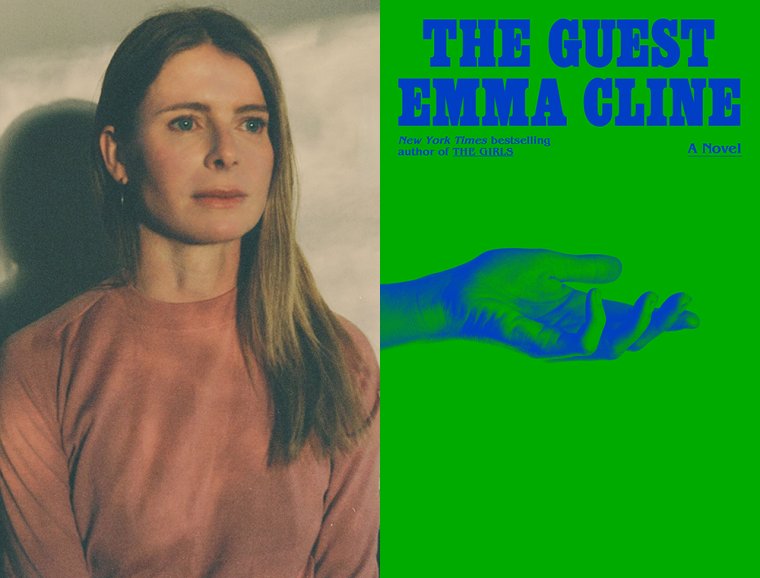This week’s installment of Ten Questions features Emma Cline, whose new novel, The Guest, is out today from Random House. In this taut and suspenseful tale, readers follow Alex during a week leading up to Labor Day in an exclusive shore community—the Long Island Hamptons is implied, but not named—where she’s been living with the older, wealthy Simon while dodging trouble back in New York City. After Alex behaves badly at a party, and Simon asks her to leave, the protagonist must devise a way back into her host’s good graces. Evoking a cross between Edith Wharton’s Lily Bart and Anna Sorokin—the con artist arrested in 2017 for swindling a group of elite Manhattanites—Alex embarks on a bleak picaresque through the pristine beaches, waterfront manors, and troubled social lives of New York’s summering class. A parasite whose whiteness, beauty, and sociopath’s ability to spot an easy mark grant her access to rarified spaces, Alex is also deeply vulnerable—a perpetual guest who knows that her privileges may at any moment be revoked. Readers will breathlessly turn the pages, wondering whether Alex will triumph or meet an unseamly end—unsure which fate they prefer for this maddening, mysterious character. “Like watching a car crash, this is hard to look away from,” writes Publishers Weekly. Emma Cline is the author of the bestselling novel The Girls (Random House, 2017) and the story collection Daddy (Random House, 2020).

Emma Cline, author of The Guest. (Credit: DV DeVincentis)
1. How long did it take you to write The Guest?
I started a version of The Guest in 2016, and returned to it off and on over the next few years while I mostly wrote short stories. In late 2019, I began focusing on The Guest in a more sustained way.
2. What was the most challenging thing about writing the book?
The challenge I set for myself with The Guest was to maintain the tension of a short story across the length of a novel. I also wanted to draw a character to carry the narrative without using the shorthand of backstory: Could I draw a character using negative space?
3. Where, when, and how often do you write?
I write sitting on the floor sometimes, and then sometimes at my kitchen table. Most rarely, at a desk. How often I write really depends on where I’m at in a project. If I’m in the middle of something, I’ll write every day. If I’m not, I’ll try to at least write in a journal every couple of days, even if it’s just a sentence or two.
4. What are you reading right now?
Blake Butler’s memoir, Molly, out this fall. It’s bleak and beautiful. Also the writings of painter William N. Copley, Percival Everett’s Dr. No, and Nell Dunn’s Talking to Women.
5. Which author or authors have been influential for you, in your writing of this book in particular or as a writer in general?
In general, I return often to the work of Mary Gaitskill. She’s tapped into some mystic vein of our psychology, and there’s this almost paranormal shimmer to how she renders the world.
6. What is one thing that surprised you during the writing of The Guest?
It’s always surprising when the book clicks into being an actual book—which I find happens at the very last minute, the point at which suddenly some energy has coalesced.
7. What is the earliest memory that you associate with the book?
The first time I saw an East Coast beach, I was so struck by the mildness of the landscape, a long stretch of dunes and the warm water and mint grasses. It looked surreal to my California eye, and I knew I wanted to write about that landscape.
8. If you could go back in time and talk to the earlier you, before you started The Guest, what would you say?
I don’t think I would have much to say. Unfortunately, or fortunately, I think a book is forged out of the writing of the thing and in the struggle to answer the questions you’ve set up for yourself, and that necessitates not really knowing what you are doing or where you are headed.
9. What forms of work, other than writing, did you have to do to complete this book?
I spent time out on Long Island, taking notes and photos, and also wrote a good deal of the book while staying with friends there.
10. What’s the best piece of writing advice you’ve ever received?
I think the best and most simple advice about any kind of writing is always this: Finish it. You can make anything better, or work with whatever you’ve done, but first just finish the thing.







